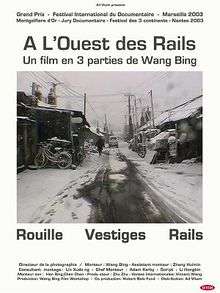Tie Xi Qu: West of the Tracks
| Tie Xi Qu: West of the Tracks | |
|---|---|
 | |
| Traditional | 鐵西區 |
| Simplified | 铁西区 |
| Mandarin | Tiěxī Qū [tʰjè.ɕí.tɕʰú] |
| Literally | district west of the railroad |
| Directed by | Wang Bing |
| Produced by |
Wang Bing Zhu Zhu |
| Cinematography | Wang Bing |
| Edited by |
Wang Bing Adam Kerdy |
Release dates | 2003 |
Running time | 551 min. |
| Country | China |
| Language | Mandarin Chinese |
Tie Xi Qu: West of the Tracks is a 2003 Chinese documentary film by Wang Bing. Over 9 hours long, the film consists of three parts, "Rust," "Remnants" and "Rails."
Tie Xi Qu was filmed over the course of two years between 1999 and 2001[1] and details the slow decline of Shenyang's industrial Tiexi district, an area that was once a vibrant example of China's socialist economy. With the rise of free market and the move towards other industries, however, the factories of Tiexi have all begun to be closed down, and with them, much of the district's worker-based infrastructure and social constructs.
Although Tie Xi Qu: West of the Tracks is rarely seen due to its length, many critics have named it one of the best and most important films of the 2000s.
Plot
"Rust"
The first portion, "Rust," follows a group of factory workers in three state-run factories: a smelting plant, an electric cable factory and a sheet metal factory. Workers of all three are hindered by sub-standard equipment, hazardous waste, and a lack of safety precautions. Perhaps even worse, the declining need for heavy industry results in a constant shortage of raw materials, leaving the workers idle and concerned for their future.
"Remnants"
The second part, "Remnants" follows the families of many of the workers in an old state-run housing block, "Rainbow Row." In particular, Wang focuses on the teenage children who concern themselves with their own lives but must also cope with their inevitable displacement as Tie Xi's factories continue to close down.
"Rails"
The third part, "Rails" narrows its focus to a single father and son who scavenge the rail yards in order to sell raw parts to the factories. With the factories closing however, their future suddenly becomes uncertain.
Reception
According to They Shoot Pictures, Don't They?, a website which aggregates critics' reviews, Tie Xi Qu: West of the Tracks is the 15th most acclaimed film of the 21st century.[2] In a 2012 poll by the British Film Institute, seven critics named it one of the 10 greatest films ever made.[3]
See also
References
- ↑ CATSOULIS, Jeannette (2007-04-18). "West of the Tracks". The New York Times. Retrieved 2007-11-24.
- ↑ "The 21st Century's Most Acclaimed Films (50-1)". They Shoot Pictures, Don't They. Retrieved September 6, 2015.
- ↑ "West of the Tracks (2002)". British Film Institute. Retrieved September 6, 2015.
External links
- Tie Xi Qu at the Internet Movie Database
- Tie Xi Qu: West of the Tracks at AllMovie
- Tie Xi Qu: West of the Tracks at Rotten Tomatoes
- Jumpcut Discussion
- Ramos-Martinez, Manuel (2015), 'The Oxidation of Documentary - The Politics of Rust in Wang Bing's Tie Xi Qu:West of the Tracks', at Third Text http://www.tandfonline.com/doi/abs/10.1080/09528822.2015.1036579